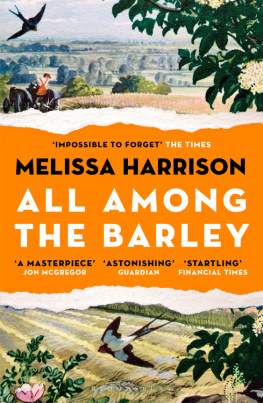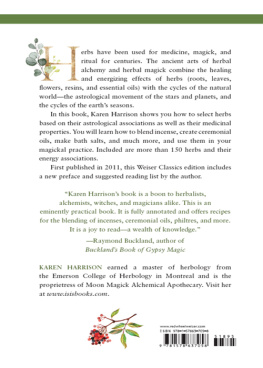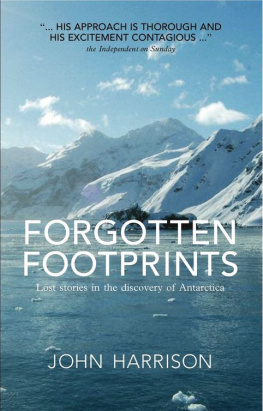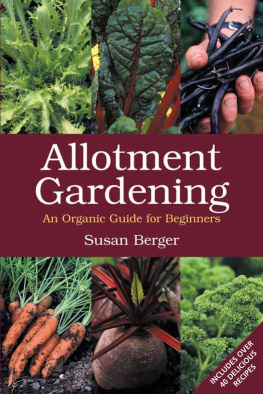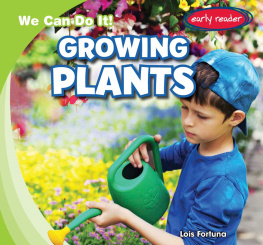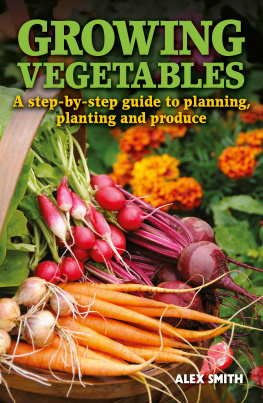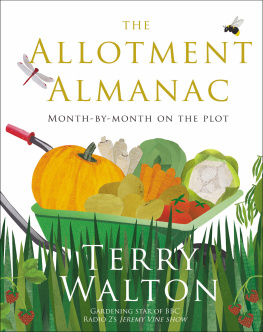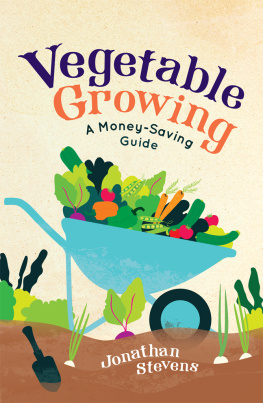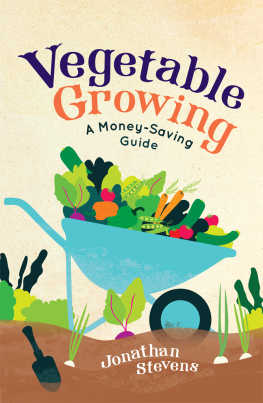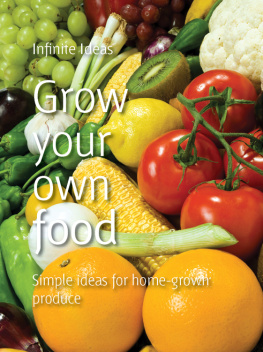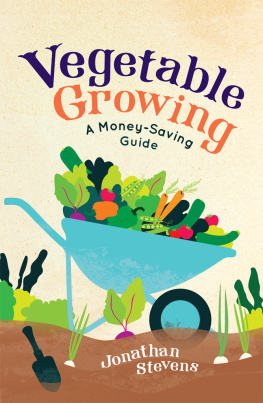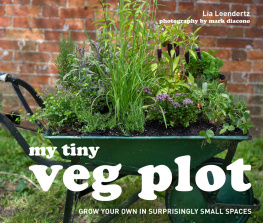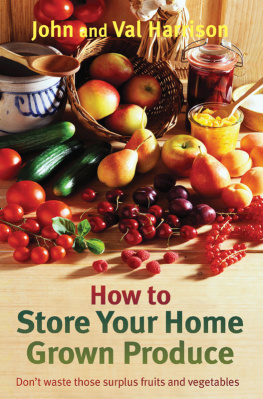THE ESSENTIAL ALLOTMENT GUIDE
By the same author
Vegetable Growing Month by Month
Uniform with this book
My thanks to Stephen Liddle
for his illustrations

Constable & Robinson Ltd
3 The Lanchesters
162 Fulham Palace Road
London W6 9ER
www.right-way.co.uk
www.constablerobinson.com
First published by Right Way,
an imprint of Constable & Robinson, 2009
Copyright John Harrison, 2009
The right of John Harrison to be identified as the author of this work has been asserted by him in accordance with the Copyright, Designs & Patents Act 1988.
All rights reserved. This book is sold subject to the condition that it shall not, by way of trade or otherwise, be lent, re-sold, hired out or otherwise circulated in any form of binding or cover other than that in which it is published and without a similar condition including this condition being imposed on the subsequent purchaser.
A copy of the British Library Cataloguing in Publication Data is available from the British Library
ISBN: 978-0-7160-2212-1
Printed and bound in the EU
1 3 5 7 9 10 8 6 4 2
CONTENTS

Fig. 1. A typical allotment.
1
WHY GET AN ALLOTMENT?
Why get an allotment? may seem a strange question to ask in a book about allotments; after all, you must at least be thinking of getting one to be reading this. Yet all the rewards that allotments can offer may not be apparent at first.
Ive been growing fruit and vegetables for 30 years now and on an allotment for the last six. What took me by surprise was the difference between allotment growing and just growing at home in the back garden.
The general view of allotments is that they are just a patch of land where people grow vegetables and thats about it, but that is a very narrow and somewhat outdated view.
Since the Second World War, land and property prices have increased hugely in real terms, despite the odd blip. Builders have crammed more and more houses into less and less land so that the modern house has a garden that is hardly bigger than a patio. And dont forget the increase in flats and maisonettes with no garden at all. For those people, the allotment provides their only real opportunity to grow anything outside of a pot.
Even if youre fortunate enough to have a reasonable sized garden, the demands on it to be a childrens play area or a decorative addition to the house rarely leave room to grow any serious quantities of vegetables and fruit. So the allotment steps in and provides that room.
If you do have a large garden, there are other benefits of an allotment that are not to be ignored. Because your plot will be on a site with other people interested in growing their own, you have a source of advice on hand. Books are helpful, but the opinion of an experienced grower on the same site can often get you to the solution faster.
Allotments provide green spaces in the city and thats a precious resource in itself. It is quite amazing how you can feel miles away from the pressure of city traffic and being overlooked by simply walking onto the oasis the allotment site is. Many a fine summer evening Ive just sat and watched the sun sink behind the boundary trees, feeling as if Im a million miles away from any cares. That to me is priceless.
Allotments help the ecology by providing some green space in the concrete jungle, increasing bio-diversity. Ive seen frogs and toads, newts and lizards, and even the most beautiful grass snake basking in the leafmould.
There is formal evidence that allotments are good for your mental health as well as your physical health. Obviously caring for your plot gets you out into the fresh air and provides exercise. Clearing and digging is just as good for you as running on a treadmill in a gym. It is productive and much more fun, as well as costing an awful lot less.
We live isolated lives nowadays. People move for a job to different areas of the country and hardly have time to speak to their immediate neighbour, let alone become part of a community. The allotment provides that vital contact and interaction we so need for our mental well being. Talking with workmates, where we are always on our guard in case the boss finds out what we really think, is not the same.
Often we dont meet many people outside of our small group of family and friends but allotment holders are a diverse bunch. On our small site you can find a retired consultant surgeon chatting with a builders labourer, and a bank manager being advised on growing by a car mechanic. You couldnt find a more different group of people but they all share a love of their plot.
This opportunity to see how others live and to develop a real community is often ignored but it is important both to the individual and to repairing our fractured society.
One great development on allotments nowadays that would not have been much seen 30 years ago is the number of women and children enjoying the allotment. The image of the typical allotment holder is no longer a retired man in a flat cap, but on many sites it is more likely to be a young woman. The allotment community has developed so much recently that some of the children I know pester their parents to come down to the plot to meet their pals.
You may wonder why people bother growing their own; after all, vegetables arent too expensive and you can buy anything you want at any time of year in your local supermarket. However, those fruits and vegetables in the supermarket, strawberries at Christmas and tomatoes in January, have often been shipped around the world at huge cost in food miles. Its obviously far better for the environment to eat locally produced food when you can and you dont get more local than an allotment.
Despite having vegetables available out of the home season, the supermarkets offer quite a narrow range. For example, you may find three or four types of potato but I have the choice of 400 types I can grow. When we plan a meal, we dont just have potatoes with it; we may have Valor or Arran Pilot or Anya. We dont have tomatoes; we have Green Zebra or Ailsa Craig or Sungold.
The taste of home grown is incomparable. If you have not tasted a pea picked, podded and eaten in one motion on the plot you are in for a wonderful surprise.
Allotments do cost money. As well as renting your plot, you have the cost of seeds, fertilizers and so forth but you will still save money. Exactly how much will depend on your circumstances and how much you would have spent on fruit and vegetables. My best estimate is that in 2009 a family of four would save about 1,500 a year, assuming they prefer their food without pesticide residues and eat organically.
Of course, that calculation does not include your labour but at least youre not spending the equivalent of one years allotment rent on one months gym membership.
On the subject of organic growing, to me the mystery is how commercial organic growers manage to supply the market at the price they do. Modern farming has concentrated on reducing labour costs with increased mechanization and it is certainly far cheaper just to spray a crop of cabbages rather than pick off caterpillars by hand. I would not qualify as an organic grower, as I do believe there are times where the use of weedkillers and chemical fertilizers makes sense. However, organic growing on an allotment scale is far easier than on a farming scale due to the diversity of crops in an area. Industrial scale farming does encourage pests to develop to biblical proportions.
Next page



